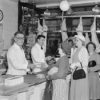Almost from the moment there were telephones… there were telephone operators.
They did more than just plug cords into switchboards. See, when the first phone companies launched in New England, phone lines were noisy. Operators not only had to quickly connect callers, they were also expected to monitor the calls, and help out if callers couldn’t understand each other.
The problem? The first operators were teenage boys who developed a rep for being, well, kind of jerks. They were impatient. They cursed. The solution seemed obvious: replace them with girls. On September 1st, 1878, Boston’s Telephone Dispatch Company hired the first female operator: Emma Nutt. She liked to joke she was glad her first name wasn’t “Imma.”
In addition to a sense of humor, Emma also had a pleasant voice. And unlike the male delinquents who preceded her, Emma and her fellow women didn’t have many other career options — so they were willing to put up with a lot more hassle. Soon America’s switchboards were run entirely by ladies.
It wasn’t a cakewalk. Operators worked grueling 12-hour shifts, for which they earned a measly $10-or-so bucks per month. And as an early operator named Marie McGrath told PBS, it wasn’t the most easygoing work environment.
Still, Emma Nutt seemed to make peace with her gig. She worked as an operator for over 30 years, and was said to have memorized every number in the New England phone book. A century later, a telecom company started offering what was basically an automated “virtual” operator for offices. They called it EMMA.
The Switchboard

Operated by Noami Levy, bar manager at Eastern Standard in Boston
- 1 1/2 oz Laird’s Bonded Applejack
- 3/4 oz Cocchi Americano
- 3/4 oz Aperol
Add all ingredients to a mixing glass. Add ice and switch (well, stir) it around. Strain over fresh ice into a chilled lowball glass.


